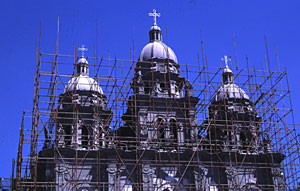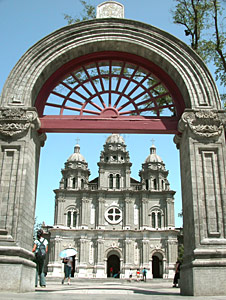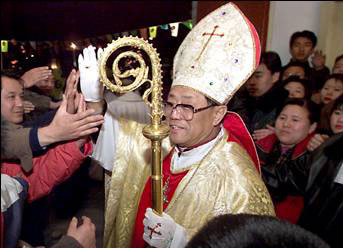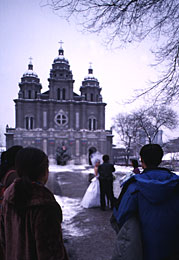China versus the Church
Beijing is spending big on church repairs and road shows to tout its religious tolerance. But for millions of Christians in China, there is still little joy at Christmas.
By Ron Gluckman /Beijing and Hong Kong
B
ELLS RING ON WANGFUJING, the capital's prime shopping street. Crowds of weekend shoppers appraise flashy Christmas window displays, offering everything from Gucci to Nike. But the big buzz is over the new addition to the boulevard - a
Catholic church on the site where Italian missionaries first held services in
1655. After a nearly $2 million makeover, the church, now called East Church,
opened this Fall to considerable fanfare. Sun lit up its stained glass, and
thousands have come to worship over the weeks since.
But the big buzz is over the new addition to the boulevard - a
Catholic church on the site where Italian missionaries first held services in
1655. After a nearly $2 million makeover, the church, now called East Church,
opened this Fall to considerable fanfare. Sun lit up its stained glass, and
thousands have come to worship over the weeks since.
The resilience, and the revival, of this church is something of a metaphor for Catholicism in China up to and during a half-century of Communist Party rule. Even with its reopening, it is a symbol of the atheist government's ambivalence about religion in China.
The original church here, called Saint Joseph's Church, was destroyed by an earthquake in 1720, and was rebuilt only to burn to the ground in 1807. Rebuilt once more, it was razed again during the bloody anti-Christian, anti-Western Boxer Rebellion, exactly a century ago.
With the Communist takeover in 1949, services were sharply curtailed and all remaining foreign missionaries forced to leave the country. The sturdy front doors were finally bolted shut during the Cultural Revolution in the mid-1960s when all ideas considered "foreign," "elitist," or "feudal superstition" were attacked, and many of their alleged proponents locked up or killed.
Worship was not allowed again at this site for two decades.
In the economic and political reform that has come since the death of Mao in 1976, there's no question that religion has made a comeback. Protestantism and Catholicism have rebounded, along with the three other religions officially recognized by the state - Islam, Buddhism and Taoism.
 Even by Beijing's official numbers, about 5 million Catholics pray in
nearly 5,000 officially registered halls or churches. There are another 10-15
million Protestants, according to state figures. Estimates by foreign missionary
groups put the figure for Protestants at 25-30 million, and Catholics at 10
million or more.
Even by Beijing's official numbers, about 5 million Catholics pray in
nearly 5,000 officially registered halls or churches. There are another 10-15
million Protestants, according to state figures. Estimates by foreign missionary
groups put the figure for Protestants at 25-30 million, and Catholics at 10
million or more.
The right to religious freedom has been enshrined in China's constitution: According to Article 36: "The state protects normal religious activities." Beijing demands that the recognized religions must be registered and operate within the confines of state-run organizations.
Beijing is eager to demonstrate that this spells religious tolerance, and pouring money into projects like St. Joseph's helps its cause. But this instinct is constantly locked in a battle with the instinct for control. Perhaps no religion illustrates the struggle between freedom and control better than Catholicism.
Clearly, the government is paranoid about any movement that evolves outside the scope of its officially sanctioned religions. Hence, the heavy-handed crackdown of groups like the Falun Gong - a spiritual group that draws from Buddhist and Taoist traditions, with heavy emphasis on meditation.
Catholicism in China is a paradox, because it is allowed in China's state churches, but allegiance to the Pope is not. Beijing severed relations with the Vatican soon after the communists took power in 1949. The Vatican and Beijing appoint rival bishops to their rival churches.
Thus, to a larger extent than Chinese believers of most other religions, Catholics have formed underground churches.
While there have been discreet contacts, and occasional signs of warming between the Vatican and Beijing, the underlying conflict easily bubbles to the surface.
In October, for instance, when the the Pope canonized 120 martyrs - including four Chinese Catholics and many foreign missionaries executed in past religious pogroms - Beijing condemned the action as a "humiliation" and a "severe provocation to the 1.2 billion Chinese people."
According to a statement from Beijing's official Xinhua News Agency, the martyrs were foreign missionaries who died in the Opium War and Boxer Rebellion, people who "illegally sneaked into the inland to preach their religion, playing accomplices to the imperialist and colonialist invasion of China, committing unpardonable crimes and deserving the punishments they received."
China was especially stung by the Vatican's timing: It named the saints on Oct. 1, China's National Day.
Even more vexing to Beijing, in the former British colony Hong Kong, which maintains a separate economic and social system even since it rejoined China in 1997, the Catholic Church held a celebration of the canonization that was attended by 1,200 people in late October, despite Beijing's appeals to tone it down. The church has vowed to hold an annual celebration of the event.
The feud between Beijing and the Vatican is also carried out in China, as authorities attempt to quash the underground Catholic Church, which does follow the Vatican. In recent months, China has stepped up arrests of church leaders, according to human rights groups.
In September, the U.S.-based Cardinal Kung Foundation reported the arrest of Zeng Jingmu, longtime bishop of the extensive underground Roman Catholic Church in China. Zeng, 81, has spent much of his life in prison.
Within weeks of Zeng's arrest, police picked up 82-year-old Ye Gongfeng in the coastal province of Fujian, according to the Foundation, which alleges that the elderly church leader was tortured and left in a coma.
 The crackdown came as China was in the midst of a major drive to
convince the world of its tolerance. In August, Beijing sent a huge delegation
of religious leaders on a goodwill tour of the United States.
The crackdown came as China was in the midst of a major drive to
convince the world of its tolerance. In August, Beijing sent a huge delegation
of religious leaders on a goodwill tour of the United States.
"Religious organizations in China run their own affairs," Bishop Fu Tieshan told an audience in Los Angeles, where the head of the Chinese Catholic Church proclaimed "a Golden Age" for religion in China.
Fu was flanked by other Chinese clerics, including state-appointed Buddhist monks from Tibet, who spoke at several gatherings leading up to the Millennium World Peace Summit of Religious and Spiritual Leaders, hosted by the United Nations at the end of August. (Notably, the Dalai Lama, the exiled spiritual leader of Tibetan Buddhists was not invited to the conference.)
The tolerance campaign failed to win over China's critics, and the tour was further undermined by the release of a stinging U.S. Report on International Religious Freedom. The annual report named China among a handful of the world's most repressive regimes, putting it in the company of Iran and Iraq.
Perhaps the controversy and public relations failures helps explain China's investment in East Church.
Beijing spent generously on the seven-month church restoration, provided hundreds of potted flowers and restored a seminary on the same site. When the church reopened, state papers touted the show of official openness.
But it seems that regardless of Beijing's attitude, the floodgates to religion have opened and Chinese people are embracing Christianity and with the doors to China open, its not easy to control the details.
"The real issue is control," says a Hong Kong woman who was born to missionaries in China, and has spent much of her life supporting underground churches on the mainland. Much of that time, in the past, was given to bible smuggling. Now, there is little need, as China churns out its own bibles at two sanctioned publishing houses.
"There have been some improvements over the years," she concedes. "People are much more in touch with the church outside China now. That's one great thing, improvement in communications the telephone, fax, emails. People are in touch."
New York-based Mickey Spiegel, who covers China for Human Rights Watch, cautions against painting a too-glowing picture of religion in China. "For the average person, there are certainly more opportunities for religious expression. But that's only for people willing to make compromises."
The entire structure of the church in China, which is stifled by state-run organizations like the Patriotic Catholic Association, is the real sticking point between Beijing and the Vatican, which has operated from a base in Taiwan since its church leaders were expelled from China in 1951.
Through a series of quiet contacts, Beijing has insisted on two things: Vatican recognition of China (instead of Taiwan) and non-interference in China's internal affairs. The first point seems less volatile, as many believe the Pope is eager to add a China visit to his legacy.
Earlier this year, the Vatican's Secretary of State was reported as saying recognition could be shifted from Taiwan to China "in a single day."
The question of control, or allegiance, is more complicated. The Pope could ill afford to sell out loyalists like Zeng, who has spent nearly half his life behind bars for his religious belief.
Others discount the gulf. "So many church leaders in China work through the sham state organization but are really loyal to the Vatican," says an underground church worker. "The Pope knows that."
 Hopes of an end to the stalemate were heightened in September when
Cardinal Roger Etchegaray made a rare public visit to Beijing to attend a
conference. The Frenchman, who also visited in 1993, is considered by Beijing to
be an emissary. Yet, instead of dialogue, the two sides retreated to fiery
rhetoric.
Hopes of an end to the stalemate were heightened in September when
Cardinal Roger Etchegaray made a rare public visit to Beijing to attend a
conference. The Frenchman, who also visited in 1993, is considered by Beijing to
be an emissary. Yet, instead of dialogue, the two sides retreated to fiery
rhetoric.
Beijing rejected the Pope's canonization, saying the alleged martyrs deserved their fate. Calling the missionaries "foreign agents," Foreign Ministry spokesman Sun Yunxi, said they and Chinese followers "were killed for bullying the Chinese people."
Reconciliation seems to have taken a step back, but at halls across the country, the diplomatic bluster matters less and less with each Mass. Away from the spotlight and posturing, scores of hand-covered bibles are held proudly by the devout.
"In the end," the Hong Kong advocate admits, "it really doesn't matter to most in China what happens between the Vatican and Beijing. Official or unofficial, they pray to same God."
Ron Gluckman is an American reporter who is based in Hong Kong, but who roams around Asia for a number of publications, such as MSNBC network, which carried this story on Christmas Eve, 2000.
Bishop pictures is from AFP; all the rest by Ron Gluckman.
To return to the opening page and index
push here
[right.htm]
